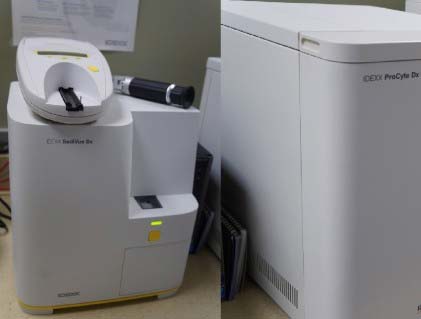In-house Lab
Helping to define health problems.
Cats are experts at hiding signs of illness. Therefore, diagnostic tests are often relied upon to help define health problems. Cat Care is able to offer a full range of in-house lab work, including the following:
- Blood Tests (Hematology, Chemistries, Serology and Endocrine profiles)
- Urinalysis
- Culture and Sensitivity Testing
- Doppler Blood Pressure
- Histopathology
Facts About Testing
We recommend testing for wellness, surgical and emergency care because much information is obtained that the veterinarian is unable to determine with a comprehensive physical exam alone.
Blood chemistry tests help the doctor evaluate the condition of the kidneys, liver and thyroid.
Electrolytes are vital to your cat's health and abnormal levels can be life threatening. Electrolyte tests are important in evaluating vomiting, diarrhea, renal and cardiac symptoms.
Hematology tests give the veterinarian a wealth of information for sick ,as well as, healthy pets. The Hematocrit (HCT) lets the veterinarian know if your cat is anemic. The Complete Blood Count (CBC) indicates the presence of inflammation and stress or the inability to fight infections. The CBC can sometimes even show the presence of parasitic infections! When the white and red blood cells are seen through a microscope, the veterinarian can also obtain information about the type of anemia, inflammation or any other abnormalities.
Abnormalities in urine often present themselves before there are changes in the blood chemistry, so a urinalysis is vital to your cat's wellness care. Urine shows changes in kidney and liver function and can be an indicator of diabetes. Along with giving a snapshot of major organ function, a urinalysis will also provide the veterinarian with a diagnostic overview of feline lower urinary tract disease.
A doppler blood pressure is vital to your cat's overall wellness. Cats who are hypertensive (high blood pressure) often have underlying diseases, like kidney disease or hyperthyroidism. Hypertension in cats may also adversely affect their vision.
It is important to get your cats blood pressure checked regularly (at least once yearly) because any changes can be significant.

